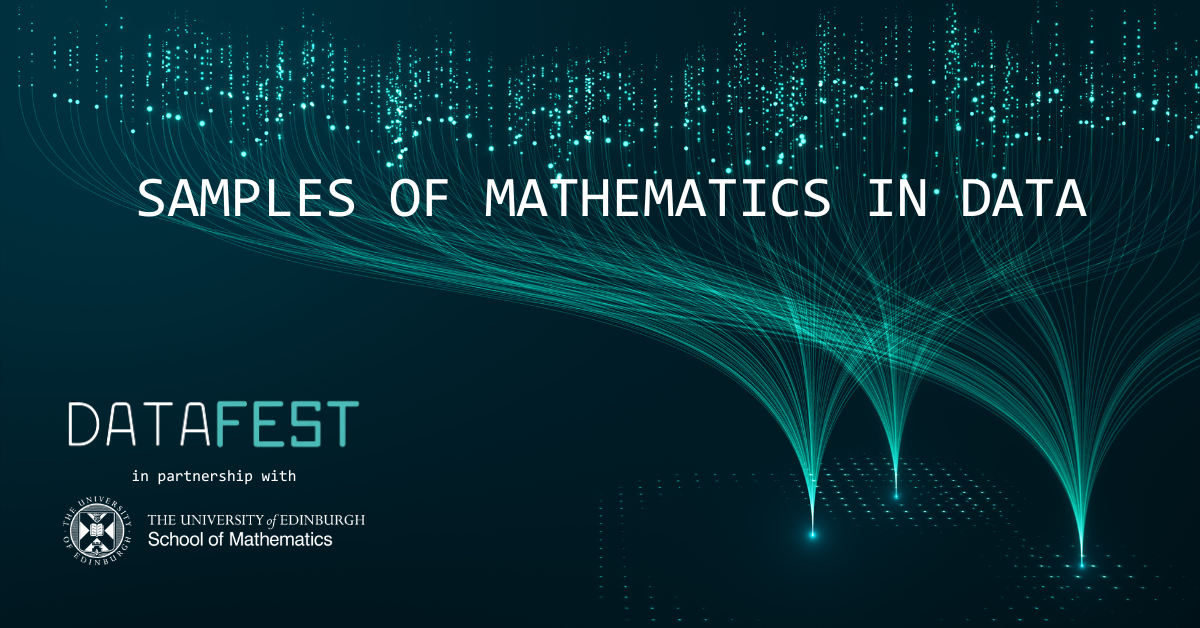Samples of Mathematics in Data: DataFringe Festival 2023

Have you ever wondered about the role that mathematics plays in the world of data? On the morning of November 6, the School of Mathematics hosted a compelling series of talks at the Bayes Centre, aiming to shed light on this question. As part of the DataLab’s DataFringe 2023 festival, these mini-lectures brought together researchers from various specializations to explore the relationship between mathematics and data. The lectures covered diverse topics, unveiling unexpected ways in which mathematical data underpins our daily lives.
How many islands are there?
Dr Geoff Vasil
Dr Vasil kickstarted the event with this deceptively simple question – how do we quantify the number of islands on planet Earth? This led the audience down a philosophical rabbit hole, with wildly different guesses at the overall number. The presentation challenged conventional definitions of an island, the status of continents, and the complications that arise when attempting to determine the length of a coastline.
The potential for classifying even a single grain of sand as an island was raised! This thought experiment, supplemented with data as a means of illustrating the problem, highlighted how mathematics is used to investigate and redefine our ever-evolving understanding of the world.
How statistics keep the lights on
Dr Amanda Lenzi (joint work with Dr Mihai Anitescu)
The supply and demand of energy was the primary concern of the second talk. Statistical analysis can play a part in helping energy providers prepare for extreme events. Dr Lenzi gave context for the need of a constant, stable energy supply to enable societies worldwide to function. This resource is often taken for granted, and only when the absence of energy disrupts typical routines is the reality of losing power is the alarming reality recognized. A poignant example is the loss of life and destruction caused by severe weather in the blackouts that Texas experienced in February 2021.
Dr Lenzi introduced us to her data forecasting research, which aims at helping to prevent major power crises by observing the operations of the energy grid in maintaining an equal demand and generation by assuming fluctuating demands. This is increasingly important as renewable energy sources are utilized more – weather forecasts also need to be considered and are not as predictable in comparison to the traditional load forecast. Her insights into the FNET dataset were designed to increase the robustness of the system by issuing recommendations based on previous observations (10 per second in 70 participating homes across the state). Historical time series data, combined with variables of weather, can help companies decide whether to invest in back-up storage reserves in the event of a power outage.
Bayesian Inverse Reinforcement Learning: Teaching Your Computer to Take Over Your Chores
Dr Torben Sell
Dr Torben Sell asked attendees to imagine how much easier life would be if a robot that could handle all of your monotonous household chores existed. Off-the-shelf robots are currently unable to perform this function to the standard that we may desire, and Dr Sell argues that Bayesian decision-making theory could improve the situation.
Like self-driving cars, a Henry hoover that has been programmed with this data in mind, and subjected to extensive testing to mimic the actions of the average chore-doer, could eventually carry out the actions itself with a comparable degree of accuracy. The technology required to make this change operational is expensive and not widely used at present, but the talk provided an optimistic outlook for people who dislike vacuuming.
Data-driven Optimization Under Uncertainty: Bridging Real-world Challenges with Mathematics
Dr Merve Bodur
Dr Merve Bodur posited that mathematics is a powerful force in addressing real-world challenges. In an increasingly data-rich world, effective use of data is essential. Up to 90% of the world’s data was generated in the past two years alone, with this trend seeming set to continue. Dr Bodur highlighted the role of data-driven optimisation in uncertain circumstances, including in sectors susceptible to unpredictable conditions such as: transport, healthcare, and telecommunications.
AI tools can prove valuable even for presenting – ChatGPT helped outline the structure of the presentation itself! Research shows that leveraging data and incorporating mathematical models (such as stochastic programming) can lead to optimized solutions to problems through building and pre-empting future scenarios, giving those in charge methods of mitigating the adverse effects that a challenge may otherwise cause.
Planning Outages in the Electricity System – Data and Models for Better Decisions
Dr Lars Schewe
The morning was wrapped up by Dr Lars Schewe with a demonstration of how data-driven support for the outage planning for GB electricity grid leads to better outcomes. Dr Schewe shared his experience with a long-term project alongside National Grid ESO: the successes and difficulties encountered when working with real-world instances from the electricity grid. The talk illustrated the ways in which mathematics and data can compliment one another when making decisions in critical infrastructure.
In summary, the School of Mathematics’ event at DataLab’s DataFringe 2023 provided a multifaceted perspective on the interconnectedness of mathematics and data, prompting compelling discussions on seemingly unrelated topics. Attendees had the opportunity to ask questions and network before and after the talks took place. Whether an enthusiastic mathematician, or someone simply curious about the role that data plays, this event showcased the interplay between data and everyday problems.



